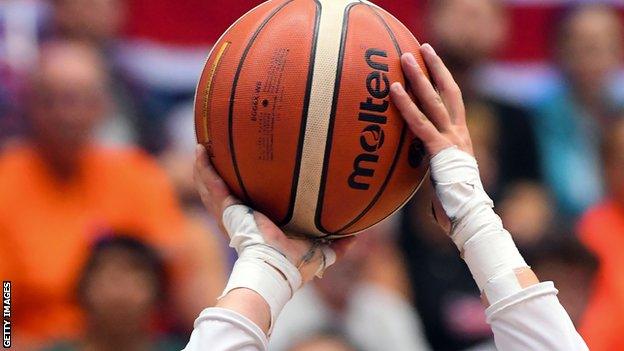Tokyo Paralympics: Wheelchair basketball could lose its place at Games
- Published

Wheelchair basketball is one of the most popular sports at the Paralympic Games
Wheelchair basketball is in danger of losing its place at this year's Tokyo Paralympics if it fails to comply with International Paralympic Committee classification rules.
The IPC says its "disappointment" has reached "breaking point" and the sport's governing body - the International Wheelchair Basketball Federation (IWBF) - must implement an action plan by 29 May.
IPC president Andrew Parsons said, despite the popularity of the sport, the IWBF is not "above the rules".
"Sadly, this is not a new issue and the IWBF has been on notice of this matter for several years and has been provided ample time and opportunity to address it," he added.
"Throughout this period, we have been very clear to the IWBF that changes must be made in advance of the Tokyo Paralympics."
Great Britain's men's and women's teams have both qualified for the Tokyo Games. The men won bronze at the Rio Games and are the world and European champions, while the women took silver at the 2018 Worlds and last year's Europeans.
Eligible impairments: Impaired muscle power (eg spinal cord injury, muscular dystrophy or spina bifida); Impaired passive range of movement in one or more joints; Limb deficiency; Leg length difference; Short Stature; Hypertonia (increase in muscle tension caused by damage to the central nervous system); Ataxia (uncoordinated movements caused by damage to the central nervous system); Athetosis (continual slow involuntary movements); Vision impairment; Intellectual impairment. | |
Examples of non-eligible impairments include: Pain; Hearing impairment; Low muscle tone; Hypermobility of joints; Joint instability, such as unstable shoulder joint, recurrent dislocation of a joint; Impaired muscle endurance; Impaired motor reflex functions; Impaired cardiovascular functions; Impaired respiratory functions; impairment metabolic functions; Tics and mannerisms, stereotypes and motor perseveration. | |
How has the IWBF responded?
In a statement, the governing body said its philosophy was designed to "make the sport as inclusive as possible" and it had "worked hard" for 18 months to come to an agreement with the IPC classification committee.
President Ulf Mehrens said the IPC's announcement had been received with "much regret and sadness".
"As the most popular team sport, the IWBF has been an advocate for a sustainable and functional classification system," he said.
Mehrens asked for co-operation and understanding from athletes, teams and member nations as the organisation takes on "the challenges we will have in the next months".
"We hope to have the collaboration and support from all our national federations as we do everything possible to serve our wheelchair basketball community and make sure wheelchair basketball secures its place in the Tokyo 2020 Paralympic Games and future Paralympic Games."
Has there been other reaction?
British Wheelchair Basketball said it was "shocked" by the IPC announcement and had been in communication with the IWBF about the matter for a "number of months".
It said in a statement: "Our position remains unchanged - that classification is the cornerstone of our sport and we are committed to meeting the approved classification code for the Tokyo 2020 Paralympic Games.
"British Wheelchair Basketball will continue to work tirelessly with other nations to ensure the IWBF makes the changes required to meet the classification requirements as determined by the IPC."
What is the background?
The IWBF defines eligible impairments differently to those agreed by the IPC general assembly in 2015 and defined in the IPC athlete classification code.
The IPC believes this has led to athletes competing who have impairments which are not covered by the IPC code. It wants all athletes due to compete in Tokyo in the 4.0 and 4.5 classes - for the least-impaired athletes - to have their eligibility reassessed by 29 May to decide whether they can play at the Games.
Those whose impairments are not eligible under the IPC code will not be allowed to compete.
The IPC says if the requested action plan is not being complied with, the sport could be excluded from the Tokyo Games. It has also been excluded from the Paris 2024 Games and will only be brought back in if the IWBF becomes fully compliant with the IPC's regulations by no later than the end of August 2021.
Wheelchair basketball has been part of the Paralympic movement since the first Games in Rome in 1960. It is the third-biggest at the Games, with 264 athletes due to compete in Tokyo across male and female competitions.